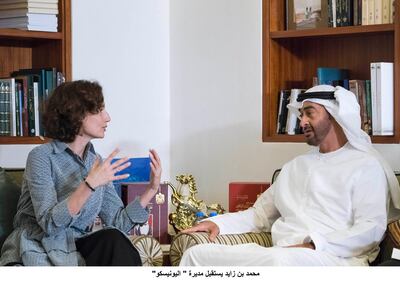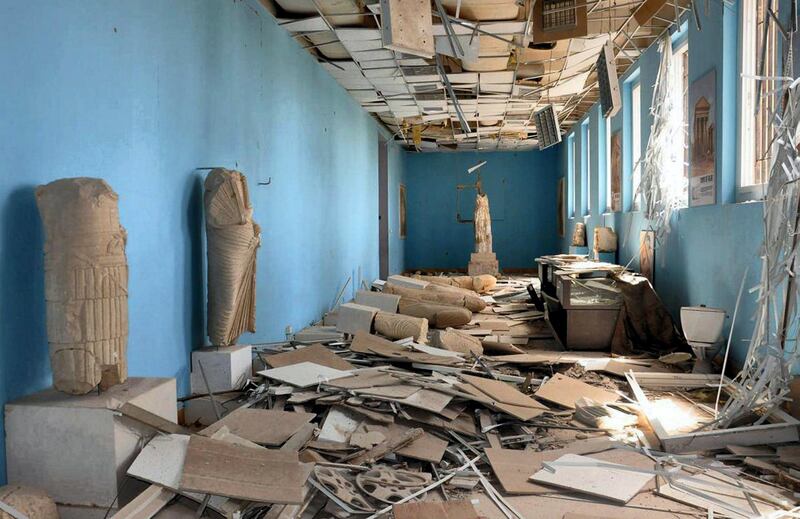The head of Unesco has warned that extremists cannot be allowed to carry out "cultural cleansing" as part of attempts to drive religions and communities apart.
Audrey Azoulay said the physical destruction of religious and historical buildings and attempts to "erase" recent history alike harms and increasingly divided world.
“In recent years, we have seen, in this region as well, an increased attempt at cultural cleansing by those who wish to erase traces of our shared history," she said.
"But culture is more than buildings, documents and traditions, it is how we see ourselves, how we see this world, how we learn about ourselves and about the others.”
Ms Azoulay was speaking in Dubai this week during a session at the World Government Summit.
She said embracing culture is a valuable tool in the fight extremism.
“When extremists try to divide humanity between us and them, we need to highlight everything that unites us as a single community,” she said.
“That’s why our teaching at Unesco is to prevent violent extremism through [core mediums] – we publish manuals to help teachers to help prevent violent extremism and we also work in the field of social media through our digital literacy programmes contributing to fight intolerant views and the dissemination of fake news.
“Science and humanities both represent the highest representation the creativity of humanity,” she said. “This is why the teaching of humanities is crucial to foster creativity, critical thinking, innovation, learning to learn and learning to live together in peace - education is not just about skills but also about passing on shared values.”

The digital age has brought with it a rising threat through social media and the internet by spreading “fake news” and facilitating the recruit of youth in violent extremist groups. “We know today that the world is facing the rising tide of [extremism] which threatens our societies,” Ms Azoulay said.
The organisation works to promote the plurality of cultural expression, to foster mutual understanding and respect for the other on the basis of human rights and diversity. “The internet can open up new conversations through the global [platforms] of dance, theatre, literature, music and films,” she added.
“Unesco is leading work on cultural diversity in the digital age and collectively, governments are increasingly aware of the extent to which culture is a bedrock of peace.”
For the first time last year, the United Nations Security Council unanimously adopted Resolution 2347 that acknowledged the broader role of heritage protection in maintaining peace and fostering reconciliation. A year earlier, the UAE held a conference for safeguarding cultural heritage in conflict areas.
_____________
Read more:
Can technology help restore Syria's lost archaeological heritage?
As rebuilding of Isil-desecrated Iraq begins, what will happen to its cultural heritage sites?
_____________
It resulted in the adoption of the Abu Dhabi Declaration in support of Unesco’s global mandate to protect cultural heritage during armed conflicts.
From Palmyra to Nimrod and Timbuktu, governments have been working on preserving the traces of the past to be able to build the future.
Ms Azoulay flew to Kuwait City to attend a conference for the reconstruction and rebuilding of Iraq.
“I will advocate for the crucial importance of human dimension and of integrating education and culture into a long-term strategy for rebuilding hope and dignity in the country,” she said.
“Unesco will lead several initiatives and flagship projects to rebuild the old city of Mosul and rebuilding people’s pride and their heritage.”
She said education, science, culture and communication were threads that bind us together.
“This is our mandate and it is more relevant today than ever,” she added.
“Our collective intelligence can help to solve the unprecedented challenge we are facing. This conversation is more needed than ever at a time of innovation when we need to think ahead of the game and build a structure on the value of human dignity.”
She also called on the need to step up investment in quality education to reach the most marginalised and disadvantaged populations.
“We have seen the power of technology through e-learning and massive open online course to enhance the quality of learning and to reach all these populations,” she said.
“We have only scratched the surface of the potential of technology in education. Unesco has always worked by focusing on the human aspect of people, through the reflection of what defines us as human beings, sciences, culture, communication and today, we relaunch this project to find the better system to put it in action and which makes us ask two questions: what are the major forces that will shape our future and more importantly, what world do we want to give to our children and based on what values?”






